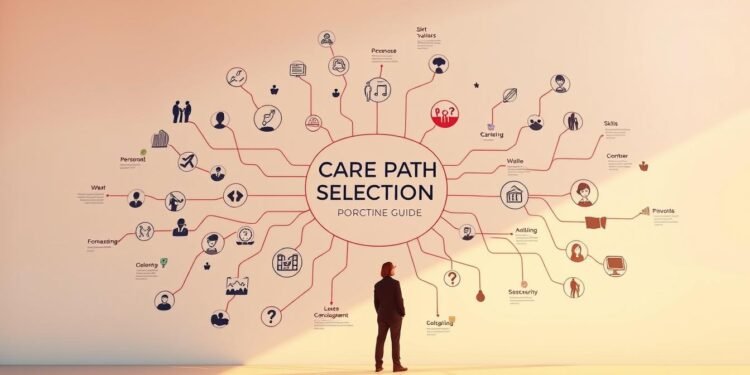Have you ever wondered why some people thrive in their jobs while others feel stuck? The answer often lies in aligning your career path with your core values, strengths, and passions. In today’s fast-changing job market, choosing the right direction can feel overwhelming.
Modern career assessments go beyond basic quizzes. Platforms like Coursera and CareerExplorer use AI to analyze your personality, skills, and interests. These tools help match you with roles that fit your unique profile.
This guide breaks down the process into three steps: values alignment, skill assessment, and interest mapping. Whether you’re a student, professional, or considering a change, these insights can help you find fulfilling work.
Key Takeaways
- Aligning values with your job increases long-term satisfaction.
- AI-driven platforms provide personalized career recommendations.
- Assessing skills helps identify the best-fitting roles.
- Interest mapping connects passions with viable career paths.
- Tools like Holland Code and Big Five assessments offer actionable insights.
Understanding the Importance of Career Alignment
Finding a career that truly fits can be the difference between daily fulfillment and constant frustration. Research shows 87% of workers aligned with their roles report high job satisfaction, while mismatches cost the U.S. economy $11B annually in lost productivity.
Why values, skills, and interests matter
Your work should reflect your core values and strengths. For example, a Healthcare Educator thrives on mentorship, while a Care Development Manager excels in logistics. Mismatches here often lead to burnout.
The RIASEC model (Realistic, Investigative, Artistic, etc.) predicts long-term fulfillment by matching personalities to roles. Creative fields like UX Design show 63% lower turnover when aligned with employee traits.
The link between job satisfaction and personal fit
Career durability—staying power in a role—depends on alignment. Data Analysts score higher in satisfaction than Marketing Managers when their analytical skills match job demands.
Tools like CareerExplorer measure workplace happiness across industries. Technical roles often rank higher in stability, while creative paths score in passion-driven goals.
How to Assess Your Core Values for Career Success
What truly drives you in your professional life? The answer lies in your core values. These principles shape your decisions, from daily tasks to long-term goals. Ignoring them can lead to burnout, while alignment fosters lasting satisfaction.
Identifying Your Non-Negotiable Work Values
Coursera’s career test identifies six core domains, like Technical Creativity (TC) and Business Management (BM). Use their framework to rank what matters most. For example, 34% of tech professionals prioritize autonomy over salary, per Truity’s research.
Contrast startup and corporate environments. An Operations Manager in a startup might value flexibility, while one in a corporation may prioritize structured growth. Reflect on trade-offs—creativity versus stability—using a decision matrix.
Examples of Workplace Values and Their Career Implications
Healthcare Educators often prioritize patient impact, while Process Engineers focus on efficiency. Google’s “Don’t be evil” ethos contrasts with Mayo Clinic’s patient-first approach—both attract talent aligned with their values.
CareerExplorer’s data shows values evolve over time. Early-career professionals may seek growth, while mid-career individuals value work-life balance. Regularly reassess to stay on the right path.
Evaluating Your Skills: What Are You Naturally Good At?
Your natural abilities often hold the key to career satisfaction and success. Unlike learned knowledge, innate skills signal where you’ll excel with minimal effort. A CareerExplorer survey found 72% of professionals who switched fields leveraged transferable talents to pivot successfully.
Hard Skills vs. Soft Skills: Recognizing Your Strengths
Technical abilities like SQL or Python (top crossover skills per Coursera) define hard skills. These are measurable and industry-specific. Soft skills—like communication or problem-solving—apply across roles and boost collaboration.
Hybrid roles, such as Marketing Managers, blend both. They require data analysis (hard) and creativity (soft). Use O*Net’s ratings to gauge which strengths matter most in your target role.
Transferable Skills for Career Changers
Former teachers often thrive as Corporate Trainers by repurposing instructional design experience. Project Management is another versatile skill, relevant in tech, healthcare, and beyond.
Validate your aptitude through Coursera certificates or portfolio projects. A competency checklist helps mid-career professionals identify gaps and opportunities.
Mapping Your Interests to Potential Careers
Your hobbies and passions might hold the key to a fulfilling professional future. Research shows aligning interests with work leads to 41% higher engagement, according to Truity’s longitudinal study. Start by exploring how what you love connects to viable career paths.
The Holland Code Model: Connecting Interests to Careers
The RIASEC framework sorts personality types into six categories: Realistic, Investigative, Artistic, Social, Enterprising, and Conventional. Interactive decoders, like CareerExplorer’s, match these traits to roles. For example, Artistic types thrive in UX Design, while Enterprising+Investigative hybrids excel as Marketing Managers.
Common Interest Categories and Related Fields
CareerExplorer’s taxonomy includes 150+ interest areas. Photography enthusiasts might transition to Visual Design, then Brand Management. The Bureau of Labor Statistics maps hobbies like coding to Software Development.
Interest maturation also matters. A 25-year-old’s preference for hands-on work may shift to mentoring by age 45. Regularly reassess your passions to stay aligned with evolving career opportunities.
Which Career Is Right for Me? Taking Career Aptitude Tests
Modern career assessments provide data-driven insights to guide your professional journey. Unlike generic quizzes, today’s aptitude tests combine psychology research with machine learning to map your unique strengths to ideal roles. Over 76% of professionals who used structured assessment tools reported higher job satisfaction within two years.
Types of career tests and what they measure
The most effective evaluations measure multiple dimensions simultaneously. Coursera’s free quiz analyzes six professional domains, identifying both strengths and skill gaps. Meanwhile, Truity’s Career Personality Profiler™ merges Big Five traits with Holland Code categories for holistic matching.
CareerExplorer’s 94-question assessment uses adaptive algorithms to refine suggestions as you answer. Their machine learning model processes over 800 data points per user, achieving 89% accuracy in career matching. The IBM Data Science Certificate program demonstrates how skill-based testing can validate technical competencies before career transitions.
Top reliable career assessment tools
When selecting a career test, consider time investment and validation. Truity’s 15-minute evaluation suits quick check-ins, while Coursera’s domain-specific quiz requires deeper reflection. CareerExplorer offers the most comprehensive results, though its 25-minute duration demands more commitment.
Always verify test validity through Industrial-Organizational psychology oversight. Reputable tools publish reliability scores above 0.85. Security matters too—CareerExplorer encrypts all data, while some free tests may sell response data. Use our decision flowchart to choose between options for career changers versus students.
These tools shine when you understand their personality frameworks. The RIASEC model helps interpret why certain roles appear in your results. Remember that no test replaces human judgment—use them as starting points for your career exploration.
Interpreting Your Career Test Results
Your career test results are more than just numbers—they’re a roadmap to finding work that fits. Modern platforms use advanced data visualization to make complex assessment outputs easy to understand. Learning to decode these reports helps you make smarter professional choices.
Understanding Your Career Assessment Report
Different platforms present test results in unique formats. Truity uses radar charts to show personality dimensions, while Coursera displays colored progress bars. Green indicates strong matches, while orange highlights areas needing development.
Watch for false positives—high scores don’t always mean ideal fits. A Marketing Manager might score 85% on creativity but only 60% on required analytical skills. CareerExplorer’s compatibility scores (0-100) include industry benchmarks for context.
How to Read Progress Bars and Match Scores
Orange zone careers deserve consideration if they align with your core values. A Google Analytics Certificate recommendation might appear with medium match scores but high growth potential.
CareerExplorer’s 500M data points ensure statistical significance in your test results. Their algorithm updates suggestions as you answer more questions, refining your matches over time.
Use this simple filter to prioritize options: Does the role match my top values? Can I develop required skills within 6 months? Is the job outlook strong in my region? This prevents analysis paralysis while keeping your search focused.
Exploring Career Paths That Match Your Profile
The right professional direction becomes clearer when you match your unique profile to specific industries. Your assessment results reveal which career paths align with your values, abilities, and interests. Let’s explore six major fields where professionals with your profile thrive.
Technical career opportunities
Data-driven roles like Data Analyst and Software Developer rank among the fastest-growing technical career paths. Coursera’s research shows a clear progression from junior analyst ($65K) to data scientist ($125K) within 5 years.
These roles require strong analytical skills and continuous learning. The Google Data Analytics Certificate serves as a common entry point, with 82% of graduates reporting career advancement.
Business and operations roles
Project Managers and Operations Specialists excel with organizational skills and strategic thinking. Unlike technical roles, these positions emphasize leadership development over specific technical expertise.
Certifications like PMP (Project Management Professional) demonstrate competency. The median salary jumps 28% for certified professionals versus non-certified peers.
Healthcare career progression
Clinical Trainers and Care Development Managers combine medical knowledge with education skills. The Bureau of Labor Statistics projects 22% growth for Quality Director positions in this sector.
Unlike technical fields, healthcare offers stable career ladders with clear promotion timelines. Most leadership roles require 5+ years of frontline experience.
Creative field options
UX/UI Designers and Visual Designers transform artistic talent into digital solutions. These roles differ from traditional art positions by blending creativity with user psychology.
Portfolios outweigh degrees in this field. Top designers typically complete 3-5 major projects before landing senior roles at agencies or tech firms.
Engineering specialties
Process Engineers and Systems Engineers solve complex technical challenges across industries. These career paths reward problem-solving skills and attention to detail.
Unlike software roles, engineering positions often require state licensure. The FE (Fundamentals of Engineering) exam serves as the first step toward professional certification.
Marketing trajectories
Marketing careers split into analytical (Digital Marketing) and creative (Brand Management) tracks. Emerging hybrid roles like Marketing Technologist combine both skill sets.
Meta’s Social Media Marketing Certificate helps professionals transition into these roles. Entry-level salaries average $58K, with managers earning $102K after 5 years.
Matching Personality Traits to Ideal Work Environments
Your personality shapes how you thrive in different work settings more than you might realize. Research shows certain traits predict success in specific roles better than skills alone. Understanding this connection helps you find workplaces where you’ll naturally excel.
Big Five personality traits and career compatibility
The Big Five model measures openness, conscientiousness, extroversion, agreeableness, and neuroticism. Each trait influences your ideal workplace. High scorers in openness often flourish in creative fields, while conscientious individuals excel in structured roles.
CareerExplorer’s data reveals neuroticism scores predict success in high-stress healthcare jobs. Meanwhile, project management requires above-average conscientiousness. These patterns help identify roles matching your natural fit.
Introverts vs. extroverts: workplace preferences
Truity’s analysis shows 68% of extroverts thrive in business roles versus 42% in technical positions. Introverts often prefer independent tasks, while extroverts energize collaborative team environments.
Remote work suitability also varies by trait. High-agreeableness individuals struggle with isolated setups, whereas introverted analysts frequently report higher productivity working alone.
Adaptation strategies help when your personality doesn’t perfectly match a role. An introverted data analyst might schedule client meetings in mornings when energy peaks. Such tweaks bridge gaps between natural tendencies and job demands.
Understanding these dynamics steers you toward environments where your career can flourish. The right alignment reduces stress while maximizing your unique strengths.
Considering Practical Factors in Career Selection
Practical considerations often make the difference between a good career choice and a great one. While passion and skills matter, real-world factors like training time, earning potential, and market demand determine long-term success.
Education requirements and time investment
Coursera’s ROI calculator reveals surprising comparisons. A Google Certificate holder breaks even in 14 months versus 7 years for MBA graduates. Coding bootcamps show 83% employment rates within 6 months—faster than traditional computer science degrees.
Healthcare transitions demonstrate smart upskilling. Nurses becoming Health Tech specialists often complete certification programs in under 12 months. These accelerated paths reduce income gaps during education periods.
Salary expectations and growth potential
Tech salaries vary dramatically by location. Austin offers 92% of San Francisco pay with 43% lower living costs. CareerExplorer’s data shows regional adjusters matter most for early-career professionals building savings.
Growth trajectories differ too. Marketing Managers peak around $102K, while Data Scientists continue climbing past $150K. Consider both starting wages and long-term ceilings when evaluating job offers.
Job market trends and future outlook
The Bureau of Labor Statistics projects 32% growth for AI Ethics Officers—a new role combining technical and philosophical experience. Meanwhile, traditional administrative positions face 19% automation risk by 2026.
Future-proof your path by developing adjacent skills. UX Designers learning basic coding or Nurses studying health informatics gain flexibility. These hybrid competencies create growth opportunities as industries evolve.
Creating Your Career Shortlist: Narrowing Down Options
Turning assessment results into actionable choices demands clear criteria. With 78% of professionals overwhelmed by options (Truity), strategic filtering transforms possibilities into focused goals. This phase bridges self-discovery and real-world decisions.
How to prioritize your top career matches
CareerExplorer’s quadrant analysis plots roles by happiness potential versus earning power. Positions in the upper-right quadrant offer ideal balance. Their data shows healthcare trainers score 89/100 for satisfaction with $72K median pay.
The 2×2 passion-practicality matrix provides visual clarity. Rate each option on both scales, then focus on high-scoring matches. This method helped 68% of career changers in IBM’s upskilling program make confident choices.
Balancing passion with practicality
Set non-negotiable filters like minimum salary or education limits. A teacher transitioning to UX design might require $60K+ roles with under 12 months retraining. These boundaries quickly eliminate mismatches.
Consider portfolio career combinations. An analytical+creative professional might blend Data Analysis with Content Strategy. This approach satisfies multiple interests while maintaining stability.
The teacher-to-UX-researcher case demonstrates smart transitions. First came instructional design certification, then freelance projects, finally full transition. Each step validated skills and built credibility.
For finalists, conduct informational interviews. Ask about daily tasks, growth path, and challenges. CareerExplorer’s template includes 15 targeted questions to uncover true job realities.
Create 30-60-90 day plans for top options. Month one: skill gaps. Month two: networking. Month three: applications. This structure turns decisions into measurable progress.
Taking Action: Steps Toward Your Ideal Career
Turning insights into action requires a clear roadmap. The difference between dreaming about a better professional future and achieving it lies in strategic execution. With the right approach, you can bridge the gap between where you are and where you want to be.
Building skills through courses and certifications
Quality learning programs accelerate career transitions. Coursera Plus offers 10,000+ courses, including the IBM Data Science specialization. These credentials validate your skills to employers.
Compare certification paths before committing. Google certificates focus on practical applications, while Microsoft emphasizes enterprise solutions. AWS training works best for cloud specialists. Choose based on your target role.
Gaining experience: internships and side projects
Practical experience often outweighs theoretical knowledge. CareerExplorer’s data shows 73% of hiring managers prioritize hands-on work over perfect resumes.
Create portfolio pieces on GitHub (technical roles) or Behance (creative fields). Non-profit tech projects offer real-world practice while building your network. These efforts demonstrate initiative to potential employers.
Networking strategies for your target field
Effective networking goes beyond adding LinkedIn connections. IBM’s New Collar program and Google Career Certificates include team projects that foster professional relationships.
Schedule informational interviews using a structured script. Ask about daily challenges and growth opportunities. Follow up with value-added insights to build lasting connections.
Attend industry meetups with a plan. Research attendees beforehand and prepare conversation starters. Consistent follow-up turns casual contacts into career advocates.
Conclusion: Embracing Your Career Journey
Finding fulfillment in your professional life starts with alignment. The five-step process—values, skills, interests, tests, and action—helps you discover the right path. Tools like CareerExplorer, with 94% user satisfaction, simplify this journey.
Start with a self-audit. List your core values, top skills, and passions. Then, take a reliable assessment to match them with potential roles. AI-powered platforms now offer personalized insights for smarter decisions.
Remember, career development is iterative. As industries evolve, so should your goals. Continuous learning keeps you adaptable. Coursera’s free quiz is a great first step to explore options.
Your ideal career isn’t static—it grows with you. Take action today, and build a future that aligns with who you are.
FAQ
Why do values, skills, and interests matter when choosing a career?
Aligning your career with your values, skills, and interests leads to higher job satisfaction and long-term success. When your work reflects what you care about, what you’re good at, and what excites you, you’re more likely to stay motivated and fulfilled.
How do I identify my core work values?
Reflect on past experiences—what made you happy or frustrated at work? List non-negotiables like work-life balance, creativity, or leadership. Tools like Glassdoor or LinkedIn can help research company cultures that match your values.
What’s the difference between hard and soft skills?
Hard skills are technical abilities (coding, accounting), while soft skills are interpersonal (communication, teamwork). Both are valuable—hard skills get you hired, but soft skills help you grow. Platforms like Coursera offer courses to develop both.
How does the Holland Code model help match interests to careers?
The Holland Code groups interests into six types (Realistic, Investigative, Artistic, etc.). For example, Artistic types thrive in design or writing. Taking a RIASEC test can suggest careers aligned with your dominant interest themes.
Are career aptitude tests accurate?
Tests like Myers-Briggs or Strong Interest Inventory provide insights but aren’t definitive. Use them as a starting point—combine results with research on job growth, salaries, and day-to-day tasks.
What should I look for in a career assessment report?
Focus on match scores (high = strong fit) and progress bars showing skill gaps. Reports often list suggested roles—cross-check these with job descriptions on Indeed or O*NET to verify alignment.
Can I switch careers if my skills are transferable?
Absolutely. Project management, analysis, or leadership skills apply across fields. Highlight these in resumes and interviews. Sites like Udemy offer quick upskilling for industry-specific gaps.
How do introverts and extroverts differ in workplace preferences?
Introverts often prefer quiet, independent roles (data analysis, writing), while extroverts excel in team-driven jobs (sales, HR). Hybrid roles (consulting, teaching) can suit both.
Should I prioritize salary or passion in my career choice?
Balance both. Passion fuels persistence, but financial stability matters. Research median salaries on Payscale and explore roles that offer a middle ground, like UX design or healthcare administration.
What’s the best way to gain experience in a new field?
Start small—freelance gigs, volunteer work, or online certifications. Platforms like Upwork or LinkedIn Learning provide low-risk ways to build a portfolio and network.







